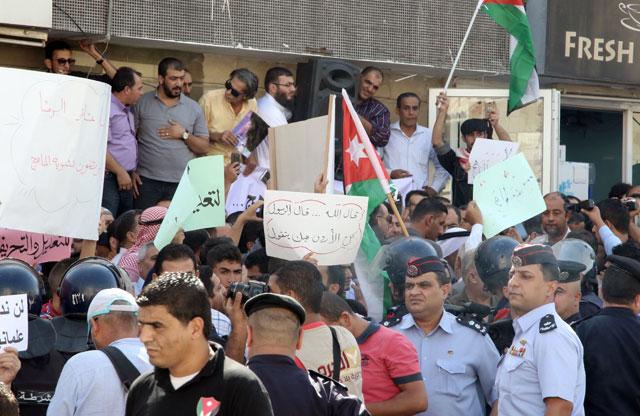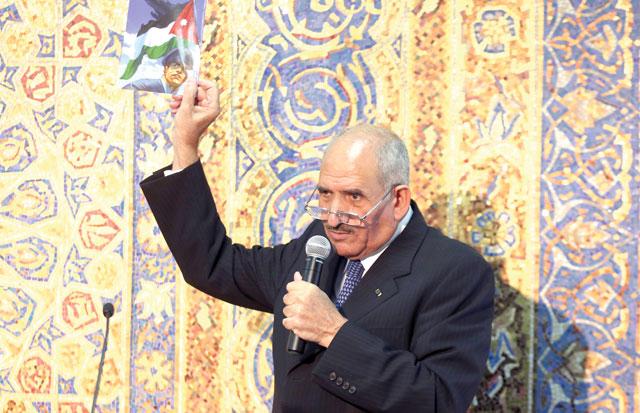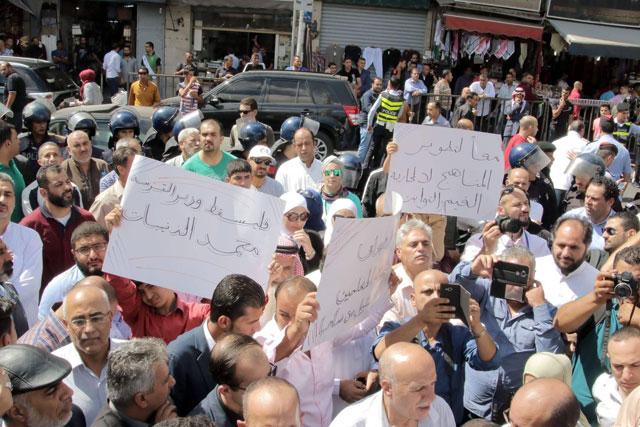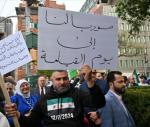You are here
Teachers, parents protest changes to school curricula
By Laila Azzeh - Sep 29,2016 - Last updated at Sep 29,2016

Teachers and parents picket the Education Ministry in Abdali, Amman, on Thursday in protest against changes to school textbooks (Photo by Osama Aqarbeh)
AMMAN — Hundreds of teachers and parents held a sit-in outside the Education Ministry in Abdali on Thursday in protest against the recent changes to school textbooks.
Earlier this year, Education Minister Mohammad Thneibat formed a committee of former ministers and education experts to review textbooks and offer detailed recommendations.
Several amendments were made to textbooks, but the outcomes were met with a mixture of criticism and applause, yet critics had a louder voice because they included the Jordan Teachers Association (JTA).
The amendments are under attack for they are perceived by some parents and education experts as a way to “alienate students from their Islamic values”.
Thursday’s protesters burnt copies of the textbooks and held banners that accused the ministry of scrapping the Islamic identity of the curriculum, chanting slogans that called for the resignation of Deputy Prime Minister for Services and Education Minister Mohammad Thneibat.
Some of the slogans read: “Our religion and heritage are redlines”, “secularism has no place in our curricula” and “stop tampering with the future of our generations”.
“We are not against developing the curricula but the changes were obviously targeting Islam and the Koran,” charged Buthaina Yousef, a teacher and member of the JTA central committee.
Other teachers and parents told The Jordan Times that many verses from the Koran and quotes from the hadith (Prophet Mohammad’s sayings) were taken out from the textbooks and replaced with content that is “unfamiliar to Arab and Muslim societies”.
“Stories about Prophet Mohammad and his companions that were considered a staple in Jordanian curricula were removed,” said Um Aseed, a mother of three children.
Islamist Jerash MP Huda Etoum called for holding those responsible accountable, while other speakers deemed the curriculum changes against the Constitution, which they said stipulates that Islam is the religion of the state.
On the other hand, other experts who support the changes say that they are “necessary” and a “step forward”, forming a campaign that seeks to defend the amendments.
“Yes for Developing the Curricula” is the name of a group that took it upon itself to clarify the reasons and necessity behind the changes.
According to the group, a “fierce” smear campaign has been “targeting the curricular changes in an attempt to link them to secular or Zionist movements”.
“We are a group of education experts, thinkers, teachers and artists who have examined a number of the new textbooks, including the Arabic language, civic education, Islamic studies and science, and believe that they are positive,” said the group in a statement.
They underlined that the curricula are still full of religious texts.
“The changes improve the image of women, encourage cultural and religious pluralism enhance the national and Arab identity,” according to the group.
Officials at the Education Ministry were not available to comment on the issue despite several attempts to reach them.
While welcoming constructive suggestions from experts in the field, the ministry has previously criticised the “orchestrated campaign” that, it said, sought to undermine efforts to develop and improve the educational process.
Curricula amendments should not be taken out of context, the ministry said.
Earlier this week, the Jordan News Agency, Petra, reported that the ministry — in what seems as a response to criticism — issued a circular to schools reminding them that teaching Koran is an integral part of the remedial programme for the first three grades that also includes math and writing.
The ministry said in its statement that the religious component of the classes is part and parcel of the programme, citing its website, where the material prepared for these additional classes has been posted.
The ministry will not tolerate any attempt to politicise education or to manipulate students’ minds, the statement said, noting that teaching Islam as a religion of moderation and tolerance was not against the faith.
On September 10, the minister again formed a committee of experts to look into the criticisms of the new curricula.
Related Articles
AMMAN — Calls for a teachers’ strike in late October to protest recent changes to school textbooks are "independent" and not orchestrated by
AMMAN — Deputy Prime Minister for Services and Minister of Education Mohammad Thneibat on Wednesday denounced what he described as a “mislea
AMMAN — Recent changes to school textbooks are under attack by some parents and education experts who perceive them as a way to “alienate st

















